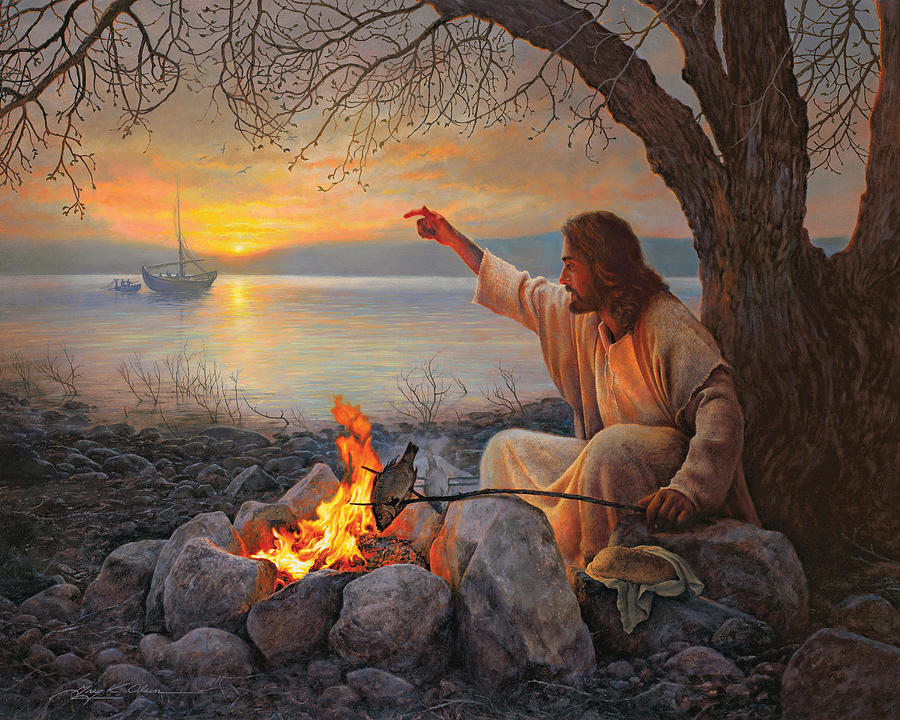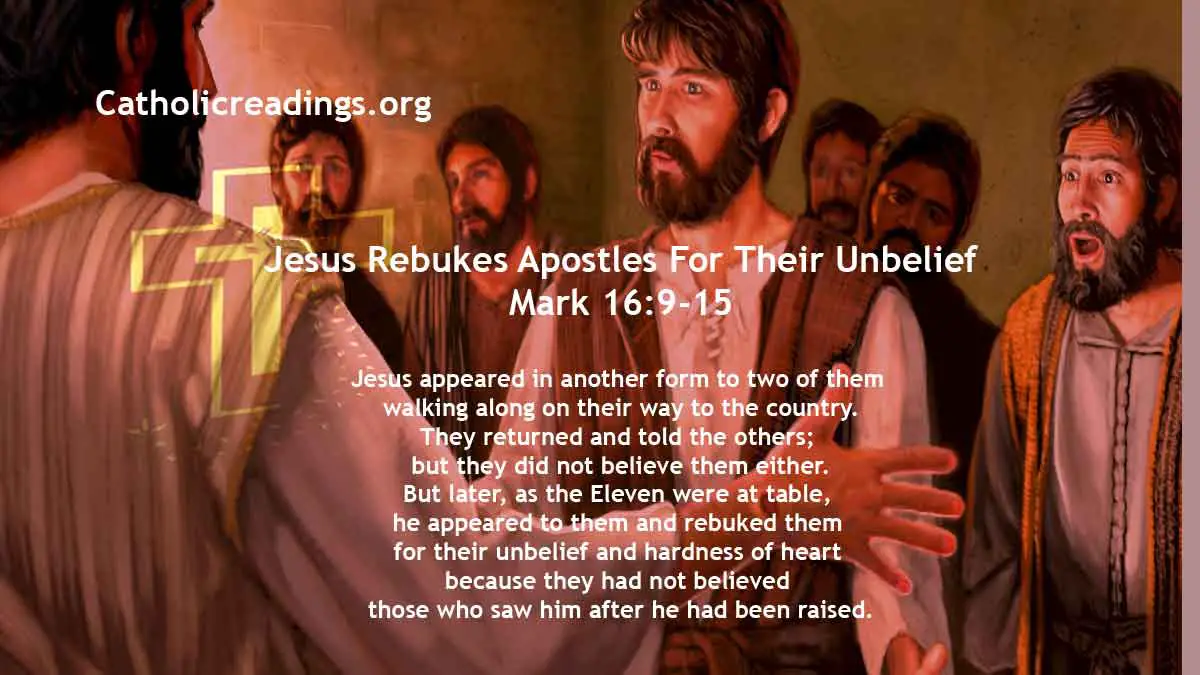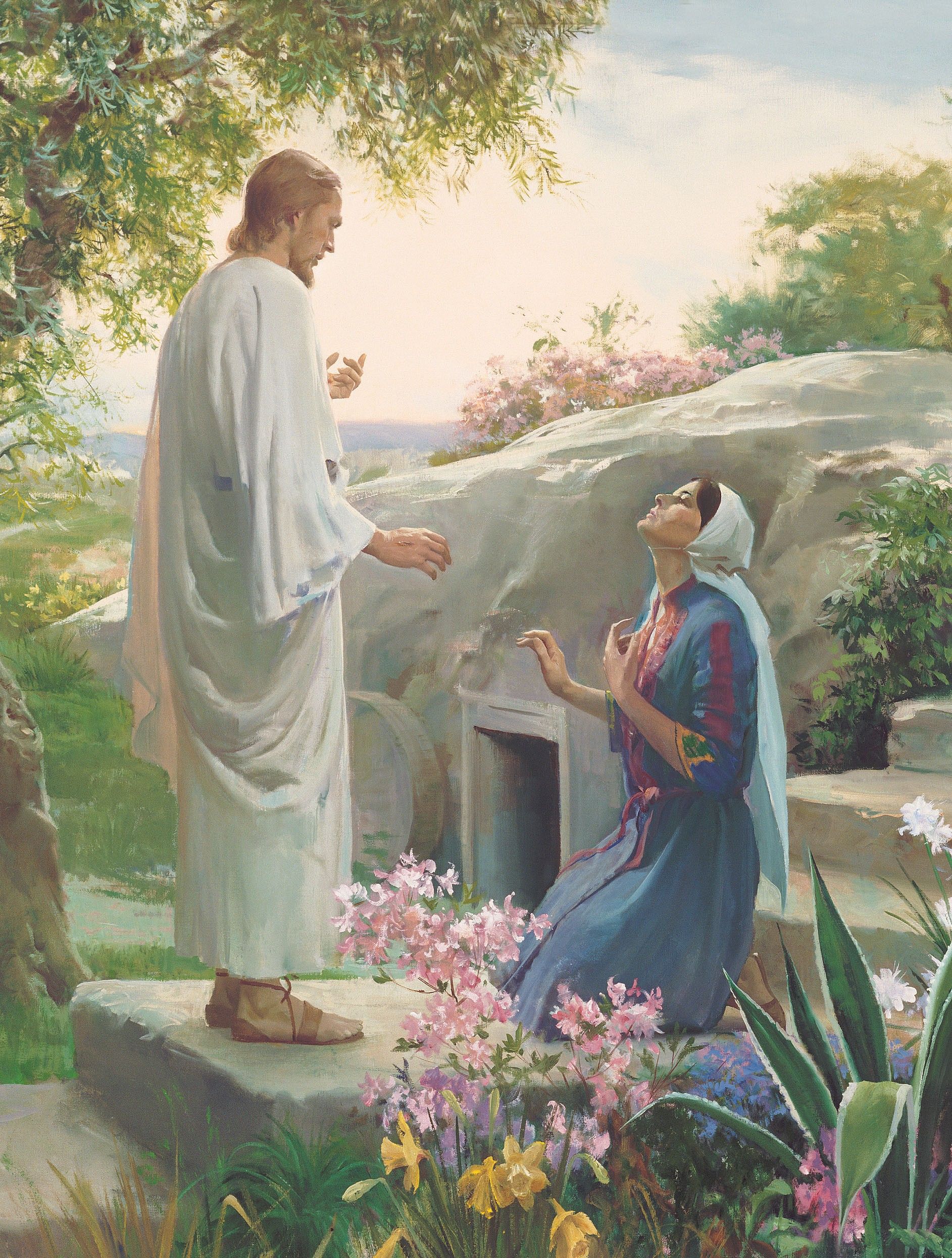
Audio Podcast: Homily 3rd Sunday of Easter
The readings this weekend have the common theme of the lamb, who was slain and those who would suffer for Jesus, the Lamb of God.
In the first reading, the court officers brought the apostles in and made them stand in front of the Sanhedrin and the high priest, who questioned them and reminded them they had strict orders to not to preach in the name of Jesus. He said, “Yet, you have filled Jerusalem with your teaching and want to bring this man’s blood on us”. Peter and the apostles boldly replied, “We must obey God and not man. The God of our ancestors raised Jesus, though you had Him killed by hanging Him on a tree.” The apostles reminded the Sanhedrin, the court officers and chief priest that they were responsible for the crucifixion of Jesus. The Sanhedrin ordered them to once again stop preaching in the name of Jesus, and the Apostles rejoiced in having to be found worthy to suffer dishonor for the sake of His name.
The second reading speaks about a vision John the Apostle saw of heaven. He saw and heard many angels who surrounded the throne of God as well as the living creatures and elders singing in unison, “Worthy is the lamb that was slain to receive riches, wisdom and strength, honor and glory and blessing.” We know that Jesus is the “Lamb who was slain” on the cross. And now at Mass, we join the angels and saints in singing and praising the Lamb of God, whose sacrifice becomes present here on the altar.
In the Gospel today, we have a resurrection appearance of Jesus, that occurred several weeks after Jesus rose from the dead. You may recall on Easter Sunday, He appeared to the Apostles in the upper Room, while St. Thomas was absent. Then after Jesus departed and Thomas returned, he did not believe the other apostles and said he would need to touch the nail marks in His hands and side to believe. But the following Sunday, He appeared again to the Apostles and this time Thomas was present. Thomas then touched the wounds in His hands and side and he believed.
Peter and some of the Apostles didn’t know what to do since Jesus had risen from the dead, so they decided to do what they were familiar with, to go fishing. After all, Peter, Andrew, James and John were fishermen by trade before following Jesus. After fishing all night long, they caught nothing. But when Jesus appeared to them on the shore, He told them to cast their nets off the right side of the boat, but fishermen normally would never cast their nets off the right side. It was not a good technique when fishing. They didn’t recognize Jesus, but threw the nets off the side of the boat resulting in catching 153 large fish. They obviously counted each fish to know how many they had caught.
I
would like to pause for a moment and tell you a fishing story. On
my senior class’s
Skip
Day,
I caught the largest fish I
ever caught without a
fishing pole or even a
fishing net. The Skip
Day was approved by parents
and the school and seniors
would pick
a getaway place to go to have fun. My
class decided to go camping
and fishing at Cedar Bluff Reservoir,
near Wakeeny
in western Kansas. In
Kansas most people use a
fishing pole when
they go fishing. But
in the time of Jesus,
fishing business owners
used large nets to throw off the side of the boat to catch a
good number of fish at
one time. On
the Senior Skip Day, I never
brought a
fishing pole or a net.
A friend and I decided to walk along the shore of the lake and there
right in front of us was a large dead
fish in
the water. I took the fish
out of the water. We
surmised the fish recently
died by getting hit by a
boat. We brought the
large fish
to the dam store and I told
a fish tale. I told the owner I had
caught the fish. He weighed
and measured it,
and said it was
the largest fish “caught” that year so far at Cedar Bluff
Reservoir
in May of 1981.
So its true, I caught a fish
without a fishing pole and without a net, but it was easy to “catch”
since it was already dead. To
be a good Christian, we always need to tell the truth even when it
comes to fishing stories. The
point is, the
apostles were telling the truth, when they said they caught 153 large
fish and were
not tell a fishing tale. In fact, it was a miracle, because Jesus placed the fish in the spot where He told them to cast their nets.
Now back to the Gospel, once on shore, Jesus had prepared some baked fish, He cooked on a charcoal fire. After eating breakfast with them, Our Lord asked Peter the same question three times, “Peter, Do you love me?” But why would Jesus ask Peter three times, “Do you love me?” Jesus wanted to give Peter the opportunity to make up for the three times Peter denied Him. At the Last Supper, Peter had told Jesus, “I will die for you?” But Jesus said, “Before the cock crows twice, you will deny me three times.”
I am not a Greek scholar, but I had several Greek classes. I was told the first two times Jesus asked Peter, “Do you love me?” He used a Greek word for love that meant, “Brotherly love”, which is sacrificial love such as a brother loves another brother or as a husband sacrificially loves his wife. But the third time Jesus asked Peter, “Do you love me?” The Greek word for “love” was changed, not to mean “brotherly love”, but “unconditional love”, which means to be willing to die for Jesus. It would go something like this the first two times Jesus asked Peter, “Peter, do you love me as a brother and friend?” “Peter, do you love me as a brother and friend?” And then the third time, it would be as though Jesus, said, “Do you love me unconditionally, to even lay down your life for me?” This would have cut Peter to the heart, because at the Last Supper he told Jesus, “I will die for you.”, but then the same night denied knowing Him three times. Our Lord told Peter to feed His lambs, to tend His sheep, meaning Peter would be the chief shepherd of God’s flock, the lambs by feeding them with the Eucharist and sound doctrine.
Just as Jesus was the Good Shepherd and lamb who was slain, so Peter would also be the shepherd of the Church and lamb that was slain. Our Divine Lord then revealed that Peter indeed would die for Him, as He said, to Peter, “Amen, Amen I say to you, you used to dress yourself and go where you wanted; but when you grow old, you will stretch out your hands, and someone else will dress you and lead you where you do not want to go”, signifying by what kind of death he would glorify God.”
34 years after Jesus ascended into heaven, in the year 67 AD a great persecution broke out in the city of Rome. Its believed the Emperor Nero’s men purposely set houses on fire to blame the Christians. And if Christians were caught by the Romans, they would be crucified on the outskirts of the city to cause fear among them. Most Christians fled Rome in great numbers but some stayed. Peter fled and when he was outside of the city, Jesus appeared to him carrying a cross. Peter asked Jesus, “Quo Vadis Domine?” “Where are you going Lord?” And Jesus responded, “I am going to Rome to be crucified again.” Peter realized he was abandoning the Christians who remained in Rome, so he returned to Rome and was captured. Peter was crucified upside down, because he said he was not worthy to be crucified in the same manner of Jesus. Peter was crucified on Vatican Hill, which today it believed to be the exact spot St. Peter’s Basilica was built.
This fulfilled the words of Jesus, who said, “Amen, Amen I say to you, you used to dress yourself and go where you wanted; but when you grow old, you will stretch out your hands, and someone else will dress you and lead you where you do not want to go, signifying by what kind of death he would glorify God.” He would stretch out his hands on the cross. Peter first pope was martyred.
Popes, bishops, priests and lay faithful have suffered and died for Jesus through the centuries. In fact, 29 popes would be martyred and 8 popes were murdered. The reason why cardinals wear a red hat, is because its a reminder, one should be willing have their blood spilled for the Church. In England the bishops, the priests and the people had to sign an oath of fidelity to the King of England, who declared himself head of the church and if they refused, they would be killed. Most bishops and priests signed it, but some bishops and priests didn’t including Bishops Thomas More and John Fischer and the priest St. Edmond Campion, refused to sign it and martyred for the faith.
In conclusion, I would like to tell you, I have a gift for you. Its a symbol of the early Christians. I will give you a hint. Its not the Willie Wanka chocolate bar. It’s not a gold ticket that will get you entry into the chocolate factory. But the item inside can take you to a new and beautiful place, a paradise. But you must be willing to do all that is asked of you. To avoid sin, to practice your faith. To embrace difficulties. To be faithful to Jesus. The enclosed gift, if you use it properly, will give you wisdom in making decisions, hope when you are sad, comfort in difficulties, to help you forgive when you are hurt, to be sorry when you done something wrong, and it will be sweeter than any candy the “Candy Man” can give. The item in this bag will help you to love as Jesus loved. He said, “There is no greater love, than to lay down one’s life for one’s friends”, which is what Peter, many popes, bishops, priests and lay people did as martyrs. I will give you one more hint, what is in this bag is what Christians through the centuries cherished so much, they were willing to die for it, and it would be there ticket to heaven.
During this month of May, let us daily pray the Rosary of the Blessed Virgin Mary and ask Her to help us to always be faithful to Jesus and when we get to heaven, we will see the lamb who was slain and sing with the angels and saints and the Virgin Mary, “Worthy is the lamb that was slain to receive riches, wisdom and strength, honor and glory and blessing.”
Click image or link for Song: "Going Fishing, Not Just A Wishing"











